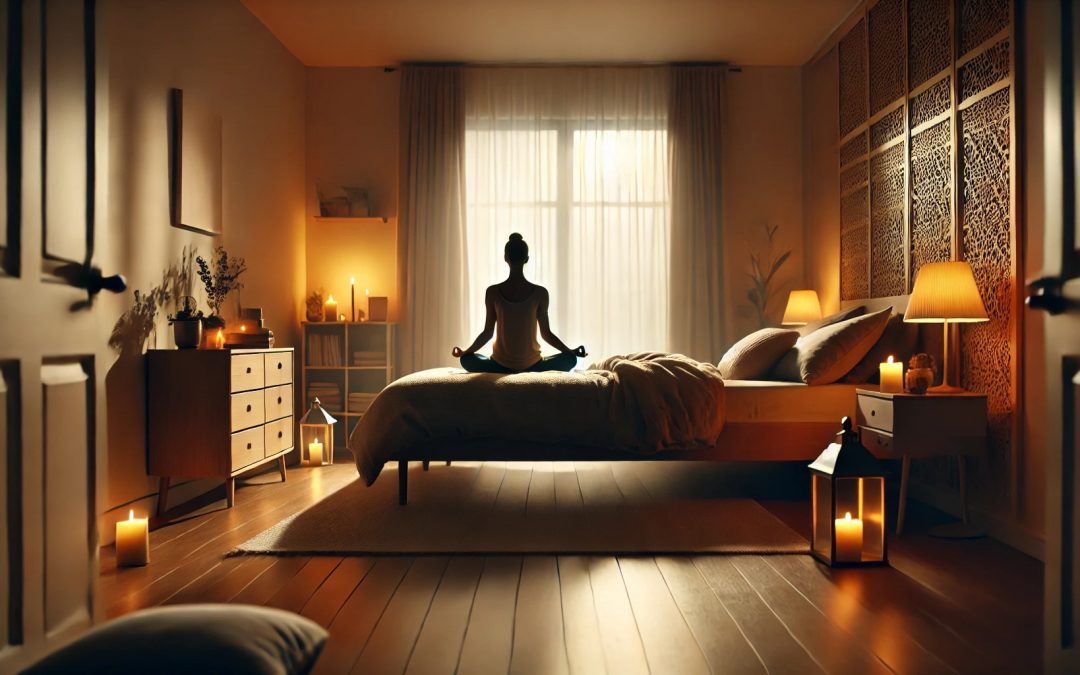The importance of sleep for our overall health and well-being cannot be overstated. Quality sleep is essential for physical health, mental clarity, and emotional stability. Yet, despite its importance, millions struggle nightly with issues like insomnia and poor sleep quality. If you find yourself tossing and turning, unable to quiet your mind, meditation for insomnia can be a game-changer.
While there are many strategies to improve sleep, meditation is another powerful tool you can add to your arsenal. Meditation has been practiced for centuries to cultivate inner peace and mental clarity, and it has recently gained recognition for its impact on sleep. By integrating meditation into your nightly routine, you can reduce stress, calm your mind, and prepare your body for a deep, restorative sleep.
In this post, we’ll explore the connection between stress and sleep, how meditation can help break this cycle, and practical techniques you can start using tonight to improve your sleep quality. Read on to discover how a few minutes of mindful practice can transform your nights and enhance your overall well-being.
Understanding the Connection Between Stress and Sleep
Stress and anxiety are two of the most common culprits behind sleep disturbances. When you’re stressed, your body releases cortisol, a hormone that increases alertness and can keep you awake. This heightened state of arousal can prevent you from falling asleep or cause you to wake up frequently during the night. One particularly frustrating scenario is the “dreaded 4 AM wake up,” where stress and anxiety cause you to wake up in the early hours and struggle to fall back asleep. This can create a vicious cycle of stress and sleeplessness, further exacerbating the problem.
How Meditation for Insomnia Reduces Stress and Promotes Relaxation
Meditation can be a powerful tool for breaking this cycle. By practicing meditation, you can reduce stress and promote relaxation, preparing your mind and body for a restful night. Meditation works by activating the parasympathetic nervous system, which helps counteract the stress response. It encourages the release of calming neurotransmitters like serotonin and GABA, which can lower cortisol levels and reduce hyperarousal. Scientific studies have shown that regular meditation can significantly reduce stress and improve sleep quality.
Types of Meditation Techniques Beneficial for Sleep
1. Mindfulness Meditation
Mindfulness meditation involves focusing on the present moment and observing your thoughts and sensations without judgment. This practice can help calm your mind and reduce anxiety, making it easier to fall asleep. To practice mindfulness meditation before bed, find a quiet place to sit or lie down, close your eyes, and focus on your breath. If your mind starts to wander, gently bring your attention back to your breath. Using mindfulness meditation for insomnia has shown to be particularly effective.
2. Guided Meditation
Guided meditation involves listening to a narrator who leads you through a series of relaxing visualizations and calming instructions. This type of meditation can be particularly helpful for sleep as it provides structure and focus. There are many apps and online resources available that offer guided meditations specifically designed to promote sleep and help with insomnia.
3. Progressive Muscle Relaxation
Progressive muscle relaxation involves tensing and then relaxing different muscle groups in your body. This technique can help release physical tension and promote overall relaxation. To practice, start at your feet and work your way up to your head, tensing each muscle group for a few seconds before slowly releasing the tension. This method is another form of meditation for insomnia that can be very effective.
4. Visualization and Deep Breathing
Visualization involves imagining a peaceful and calming scene, such as a beach or a forest. Deep breathing exercises, on the other hand, involve taking slow, deep breaths to calm the nervous system. Combining these techniques can help create a sense of tranquility and prepare your mind and body for sleep, aiding those who suffer from insomnia.
5. Lucia Light Meditation
Lucia Light meditation is a unique technique that uses flickering light to stimulate the brain and promote deep relaxation. The light affects brainwave activity, helping to induce a meditative state that can enhance sleep quality. Studies and testimonials suggest that Lucia Light meditation can be highly effective for those struggling with sleep issues and insomnia. Please keep in mind that this style of meditation requires that you have a Lucia light.
Creating a Bedtime Meditation Routine
Incorporating meditation into your bedtime routine can significantly improve your sleep quality. Here are some simple tips to get you started. There is no need to over complicate it at the beginning but three things that are worth paying attention to are consistency, environment, and duration.
Consistency: Practice your meditation for insomnia at the same time each night to establish a routine.
Environment: Create a relaxing atmosphere with dim lighting and a comfortable setting.
Duration: Start with short sessions and gradually increase the duration as you become more comfortable with the practice. There is absolutely nothing wrong with starting with just 3 minutes and building up from there.
The Worry List: A Practical Tool for Better Sleep
In addition to meditation, creating a worry list can help clear your mind and reduce anxiety before bed.
1. What is a Worry List?
A worry list involves writing down your concerns and thoughts before bed to prevent them from racing through your mind at night, thus complementing your meditation for insomnia routine.
2. How to Create a Worry List
– Set Aside Time: Designate a specific time in the evening to write down your worries.
– Write It Down: List all the things on your mind, from small daily concerns to larger issues.
– Organize Your Thoughts: Categorize your worries into what you can control and what you cannot.
– Cross Off and Solve: Cross off each worry after writing one thing you can do to find a solution, even if it’s as simple as trying to get a good night’s sleep.
3. Benefits of a Worry List
– Reduces anxiety by externalizing worries.
– Improves sleep by clearing the mind of stressful thoughts.
– Promotes problem-solving and mindfulness.
Additional Tips for Enhancing Sleep Quality
Combining meditation and worry lists with other sleep hygiene practices can further enhance your sleep quality:
– Limit Screen Time: Avoid screens at least an hour before bed to reduce blue light exposure.
– Regular Sleep Schedule: Go to bed and wake up at the same time every day.
– Healthy Lifestyle: Incorporate physical activity and a balanced diet into your daily routine.
– Limit Alcohol: While a nightcap might seem like a good way to unwind, alcohol can actually interfere with your sleep. It may help you fall asleep faster, but it disrupts your sleep cycle, particularly the REM stage, leading to a restless night and reduced sleep quality. Moderating alcohol consumption, especially in the evening, can help you achieve more restorative sleep.
– Patience and Consistency: Be patient and consistent with your meditation for insomnia and worry list practices for the best results.
Related Resources:
1. The Science Behind Meditation and Sleep – This article from SleepFoundation.org delves into the scientific aspects of how meditation impacts sleep quality.
2. How to Start a Mindfulness Meditation Practice – Mindful.org provides a comprehensive guide on beginning a mindfulness meditation practice, which can be beneficial for insomnia.
3. Guided Sleep Meditations for a Restful Night – Headspace offers various guided sleep meditations that can help you relax and prepare for a restful night.
4. Progressive Muscle Relaxation: Benefits and Steps – Learn about the benefits and steps of progressive muscle relaxation, a technique that can enhance your meditation for insomnia routine, from the Cleveland Clinic.
5. Breathing Exercises to Reduce Stress and Improve Sleep – Healthline discusses effective breathing exercises that can help reduce stress and improve sleep quality.


Recent Comments